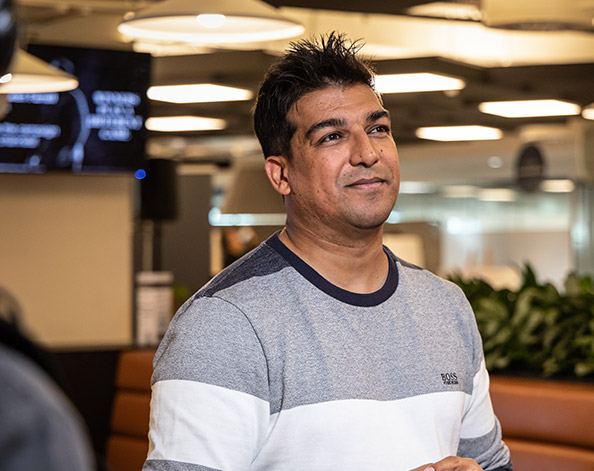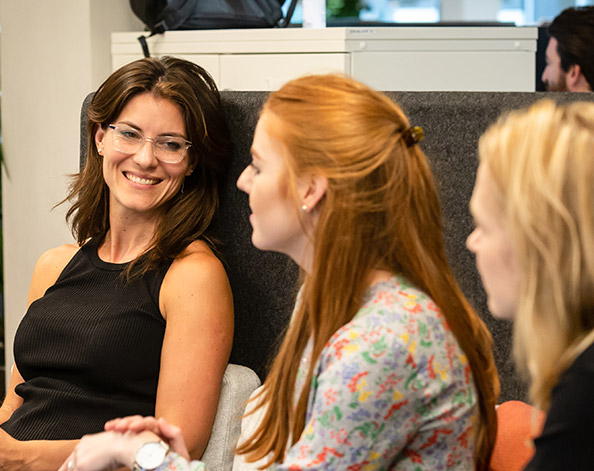It’s approaching midday on a typical Thursday in late September, and nearly 300 people are congregating on the fourth floor of 30 Gresham Street in the City of London. They’re not attending a financial conference or taking part in mandatory training. In fact, most of them are playing rock-paper-scissors. Later in the day, they’ll take part in a mobile treasure hunt and try out the world’s largest Pac-Man arcade machine, all in the name of innovation.
Welcome to Investec’s annual 24-hour hackathon, where employees from across the organisation search for cutting-edge solutions to some of the company’s biggest issues.
What is a hackathon?
Hackathons are intense, high-energy events that bring people together for short bursts of time. They were originally targeted at software developers and tech entrepreneurs with the goal of making product prototypes by the end of the event.
However, many companies are now moving away from coding-only hackathons and using the events to kick-start other new ideas. A 24-hour hackathon can reduce the time it takes to get a product or service to market by between 25% and 50%, according to McKinsey & Co.
“Hackathons are a popular tool in a lot of organisations, and the whole point of them is to throw people together. The way I always describe it is they encourage ‘doing’ and ‘making’ over ‘talking’,” says Dr Nick Taylor, a Senior Lecturer of Social Digital at the University of Dundee. “It’s this emphasis on doing something that fosters an atmosphere of creativity.”
Hackathons also give people who might be based in different buildings and departments the chance to meet and share ideas outside of the working day.
“These relationships regularly last beyond the hackathon. The actual output of the event itself, whatever artefact you build, might not go further, but the relationships themselves often do.”
How we hacked Investec
At Investec, the hackathon attendees are split into 33 groups of up to 10 people. The theme is ‘Investec hacks Investec’ and teams look for new ways to disrupt current products, designs, processes and technologies that will benefit clients and staff.
In addition to developers, employees from operations, data analytics, client support, marketing, sales, HR and other teams are taking part. They have travelled from offices across the UK.
Each group is focusing on a different topic, but they are all hacking one of Investec’s five business priorities: capital discipline; growth initiatives; cost management; connectivity; and digitalisation. Experts from Google and Amazon are also on hand to help the teams build the tech needed for their projects.
“We’ve been very specific about accelerating innovation at the hackathon,” says Rosemarie Pinto, new business innovation lead at Investec. “We want people to come in, build something rapidly and prototype it, so that we have a workable solution that we can then roll out across the organisation.”
Lyndon Subroyen is Global Head of Digital & Technology at Investec and the event’s main executive sponsor. He says the hackathon reflects daily life.
“Investec has a culture of experimentation. The entire business has always been built in that way. We try things and we look for opportunities to create and add value for our clients and inspire our people,” he says.

Also read: six myths about financial services challenged by InvestecInvestec has a culture of experimentation. The entire business has always been built in that way.
Inside an entrepreneurial culture
Fresh ideas need the right culture to thrive.
Dr Kamal Birdi, a Senior Lecturer in Occupational Psychology at Sheffield University Management School, explains: “An analogy I like to use is that it’s similar to growing the most beautiful palm tree in a greenhouse, and then planting it in the Arctic. It’s not going to grow.” he says. “Great ideas are the same; without a nourishing environment, they’ll eventually wither away and die.”
According to Dr Birdi, less bureaucratic and more flexible workplaces bring out the best in people. They also need different types of characters and experiences to be innovative. “This means having a diverse mix of skills and knowledge, a shared vision and lots of internal and external communication,” he adds.
For this reason, Investec has always aimed to hire people who can challenge the norm and give them freedom to decide how they work.
Big hackathon ideas
Several hours have passed at 30 Gresham Street and the teams are beginning to make real progress with their ideas. The event is held across the fourth and fifth floors, and a group of roaming judges are chatting with participants at the work stations dotted throughout.
Shaun Karpelowsky, Lead Advisor on EU Strategic Banking Initiatives and Head of Central Compliance at Investec, is one of the judges. He’s helping whittle the teams down to a final six who will pitch their ideas to Investec executives.
“What I’m looking for is the identification of a real problem and a solution that will really make a difference to our clients or our people,” Shaun says.
The judges have their work cut out for them. Every team is confident they are tackling a real pain point for the organisation and many have started working on their prototype.

- Médecins sans Papier (Doctors Without Paper) are building an online portal to streamline client data collection.
- Investec For All hope to develop a one-stop shop for the organisation’s network of more than 3,000 IFA firms, which would help advisers sign in and work with Investec more easily.
- The Podsters are working on an app called Intro Fuelled by Investec where people can recommend their favourite podcasts.
- Meanwhile, Team Chickpeas are designing a digital tool, nicknamed ‘HeartBeat’, to monitor the wellbeing of Investec staff in real-time. The team believes a functioning app could be produced with just five days of follow-up work.
Learning and innovation
The ideas may be wildly different, but the teams can agree on one thing: the hackathon helps them learn new skills.
Harris Gorre of Investec For All says the event makes everyone feel motivated. “It's the most productive I’ve felt the whole year in terms of getting people in a room and having them really focused on issues that could move the dial,” he says.
Learning opportunities make work life more positive. A study from management expert Josh Bersin and LinkedIn found that employees who spend five or more hours learning at work are 47% less likely to be stressed. They are also 21% more likely to feel confident and happy and are 23% more prepared to take on additional responsibilities.
Lucrecia Grandolini, Head of Continuous Learning at Investec, says events like the hackathon are just one way to help people feel fulfilled.
“We cover all types of learning, from technical and professional to personal growth and wellbeing. We don’t hire just skills, we hire human beings – the full package with life experiences, passions and interests,” she explains.
“This is why at Investec you will never feel like just a number. We respect everyone for who they are and provide a platform for them to grow and develop further.”
How fun workplaces encourage innovation
As the evening progresses, energy levels at the hackathon naturally begin to flag, but there’s a plan in place. Remember the rock-paper-scissors, treasure hunt and Pac-Man from earlier? That’s just some of the entertainment on offer during the event.
There is also a silent disco and a drumming workshop for people looking to shake off tiredness. Some employees can be seen bouncing around on space-hoppers, while others speed along the hallways on micro-scooters, as they take much-deserved breaks from their projects.
At 10pm, a mass pizza delivery provides a boost as the event heads into its tricky early hours. There is also a chill-out zone fitted with beanbags, blankets and places for people to nap when they finally run out of steam.
Rosemarie says the hackathons always have planned fun along the way to keep everyone upbeat, but the breaks are part of the creative process too. “When we take time to step back and understand a problem or opportunity, we see angles and side effects we missed,” she says.
According to Lyndon, the energy at Investec is similar to a permanent hackathon feel. “It’s great to be able to celebrate it in a single day like this. Our goal is to unlock the same creativity and collaboration every day.”
Taking home the trophy

Twenty-four hours in to the Investec hackathon, the roaming judges had narrowed down the original 33 teams to just six: Benny and the Jets; Investec For All; Médecins sans Papier; Podsters; Team Chickpeas; and Speech recognition for CRM calls.
The final six presented their ideas to the judges, and despite stiff competition from the other groups, Investec For All was chosen as 2019’s winning team. They created a platform for financial advisors to view Investec’s services in one place and clinched the top prize of a trip to Silicon Valley for their efforts.
“It’s been a journey, but the reward is not the prize, the reward is that other people can see what we saw in our idea,” says team member Harris Gore. “There were other people in that room that recognised what we’d been feeling over the last seven hours with a real burning desire.”
Working at Investec
While Investec For All were the eventual winners of the hackathon, victory isn’t the main objective.
John Elliott, Head of Fintech and open banking partnerships, was a roaming judge at the event. He explains: “The problems that people solve are probably less important than what actually happens. It’s about getting people to start thinking a little bit outside the box.”
Ultimately, hackathons reflect a company’s culture and what it can offer employees. The events encourage fresh ideas, freedom to operate, honest conversations and diversity of thought.
When asked to sum up the day in three words, people frequently said it was “fun”, “innovative” and “dynamic”. Admittedly, “tiring” was also a popular answer.
‘Culture is our differentiator. We’re open, honest and people are able to be who they are.’
“I think the hackathon is a really fun reflection of Investec. I don’t know many places where you get people voluntarily spending 24 hours together to work on something just for fun,” said Symmie Swil of Médecins sans Papier.
Leon Weed was part of Team Chickpeas. The team made it to the final six but was pipped at the post by Investec For All. Nevertheless, a platform for measuring the organisation’s health was considered a stand-out idea and has already been trialled.
Leon feels proud to be part of the event – and the organisation: “Investec is a fun place and it’s innovative. You get to be an entrepreneur and people trust in what you do,” he says. “Culture is our differentiator, and I imagine every other team would say the same thing. We’re slightly different from other financial services firms. We’re open, honest and people are able to be who they are.”

.jpg)
